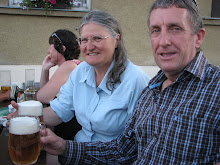
From Kaifeng we travelled by train. From the train window we saw lots of fruit trees and villages with these pawlaunia trees (a soft wood tree we call Chinese coffin tree as it is used to make boxes etc) and they reminded us of the lane where we live which has several trees like this.
Chinese tradition (some areas) has it that when a person is born, a tree is planted for him or her. After that person dies, his "coffin" tree is harvested for that purpose. For one to be buried otherwise would doom his spirit to wander forever.
This reference was posted to me by someone who read the blog so I will add it here. Thanks JP.
A French Canadian lady recommended the Ibis hotel to us so we enjoyed being in a new place with all the conveniences one needs and being cheaper than the International Hostels and even the highly rated hostels on www.hostelworld.com and we spent some time relaxing there. (I have recently tried adding links to my blog so I hope they work).

I complained that the heating was too cold and the hotel manager brought us a platter of delicious fruit and then we discovered that we had the aircon on cold!
According to our guidebook "Xian was a classic world city two centuries before Homer penned Iliad and (and Rome was founded) and five centuries prior to Buddha's enlightenment", phew that makes it pretty old!

One night we saw a restaurant on the second floor that looked full of people so headed in to eat. Two girls in uniforms chorused a greeting to us and put us in the lift to the 2 floor. We had arrived at a hot pot restaurant. Only one young man spoke a little English and we had left our Mandarin phrasebook behind. He presented us with a sheet of paper all in Chinese. We had to fill in how many of each dish we wanted but had no idea what there was. We drew some pictures of what we would like and most of the vegetables we drew they didn't have "Mei you" (No have). From the back of the restaurant a group of Chinese teenagers appeared and helped us with our order saying "You don't know what is delicious but we do". An Australian girl was with them and they had treated her to duck tongues and pig palettes! That got us worried as to what we would end up with.
At a hot pot restaurant you order small dishes of thinly sliced meat, chopped vegetables, and dipping sauces and they go into a broth (spicy or non spicy)in a large pot in the centre of the table and you regulate the temperature and cook things to your taste. After cooking everything you drink the soup which is so yummy. It was an inexpensive meal and we went several times more and never paid more than $4nz.
The Chinese people are very curious. If you open your bag they will crowd around and look in it. If you have a card in your hand someone will try to take it to read it. They are also very friendly and will jabber away even if you don't understand. If you ask for help they will try to help you. So we have had a lot of fun communicating without having their language.

These huge pots can be seen outside restaurants and soup of some sort will stew away for hours inside in small crockery dishes with handles. I am not sure how they are heated but the dishes are all stacked on racks inside.

The epic caravans of the Silk Road east terminated in Xian along with the camels ladened with exotic trade goods as well as invited Buddhist monks and Islamic emissaries.Today there is a huge Muslim area with a street market and night market selling food and handicrafts.
The minaret

We visited the Great Mosque which was nothing like the domed mosques that you immediately think of. The minaret was like a little pagoda.

There were some Muslim families visiting and having pictures taken so we snapped away too. It was a nice peaceful place away from the souvenir sellers yelling "Hello, hello, hello, hello, come and look." 50 choruses of this is so annoying!

There is a Bell Tower in the centre of the street dating from the 14th century but was rebuilt by the Qing in 1739.
It was easy to get around by local bus at 20c nz each - the same price as a haircut, and street food.
